A tale of two Twitters: A generational divide among App State sports fans
The “Cone Gang.” From the left: Will Strickland, Bailey Lang, “Dusty Korns,” Parker Stone, Andrew Curry and Will Taylor welcomed the App State men’s basketball team home from the Sun Belt championship last week. The crew is invested in all App State sports, and rally online, usually on Twitter, to support university athletics.
March 18, 2021
A cornerstone of App State sports is fans taking to Twitter to express their thoughts, get excited and talk a lot of smack. Fans have dubbed this online community “’Neer Twitter.”
Though anyone can participate in ‘Neer Twitter, some users have devoted countless hours of effort into their accounts and content, which have made them thought leaders within the university community, the athletics department and even the Sun Belt Conference.
Charles Haynes, or @bigCasu on Twitter, graduated from App State in 2003 and credits himself as the creator of ‘Neer Twitter. Haynes got his start online in 2001, a time when message boards were the norm of online chatting.
“I joined Twitter in March of 2009 and I said, ‘I’m just going to follow all the App athletes,” Haynes said. “‘I’m going to promote them and give these men and women the recognition they deserve.’”
Haynes said he developed his moniker doing pre-game write-ups for the football program on App State message boards and later on his website, BigCTailgate.com.
Haynes later became acquainted with Alex Johnson, a 2011 graduate, and the two started “The Black and Gold Podcast” (@BlackAndGoldPod) in 2015. Their mission: discuss App State sports with greater honesty than TV and radio commentators are allowed.
“People should be able to address haters in a less official way with context that they may not be thinking about,” Johnson said. “We want to treat App State sports like it’s important.”
Johnson was a freshman at App State in 2007 when the Mountaineers famously upset Michigan and won their third straight national championship. When Twitter debuted, countless users from this generation of alumni joined the online fray in the early 2010s.
Very few of the accounts are for users’ personal content. Almost all of them are burner or alternate accounts used for App State sports content.
“I told myself, ‘I kind of want to get in on this, but I don’t want it to be on my main account to clog my feed and make it all about App sports,’” said Parker Stone, or @ConeEnforcer on Twitter. “It made so much more sense to have an account that I could create content through.”
An overwhelming number of these accounts are anonymous. Of the seven users interviewed for this article, an equal amount declined to contribute to retain their anonymity. Among them is a parody account of Dustin Kerns, the men’s basketball coach.
Some users theme accounts around niche content. John Miller, or @AppStTailgate on Twitter, uses his account to share his App State trading cards and autographed memorabilia.
“I think a lot of people follow me because I write about different stuff than normal,” Miller said. “People want to see the trading cards, and a lot of my trading cards are rare, so some of the ones I have are the only ones.”
Taylor Adams, or @GonzoApp on Twitter, is amazed at how App State fans have used ‘Neer Twitter to disrupt the status quo and troll opposing fanbases. In 2018, he used Twitter to deny UNC-Charlotte students a home game tailgate experience.
“I spread the word amongst App Nation and the Twitterverse, and we stole all of their tailgate spots,” Adams said. “Their students were deprived of a tailgate experience. There’s no way that the old grassroots can work in such a sophisticated way to pull something like that off.”
Fans also use Twitter to try to sway AP poll voters to select App State football for national rankings, Adams said.
“There are voters that are, probably to a fault, tagged on a regular basis,” said Adams. “So that hopefully is not making people so annoyed with our fans that they’re disinclined, but it’s a powerful tool.”
To some dismay, Twitter is also used by fans to persuade potential recruits to play for the university.
App State fans involved with ‘Neer Twitter since the app’s beginning consider themselves the gatekeepers of the online conversation and how fans talk about App State sports. In recent years, however, a younger fanbase has made itself known.
Will Strickland, or @AppStateConeBoy on Twitter, was kicked out of a basketball game against Louisiana-Lafayette for heckling in January 2018. The event was the beginning of a new age of ‘Neer Twitter.
“It really blew up after Will got kicked out of a basketball game,” said Stone. “We’d be going to TApp Room afterward, and people would be patting us on the back and asking if they can buy us drinks.”
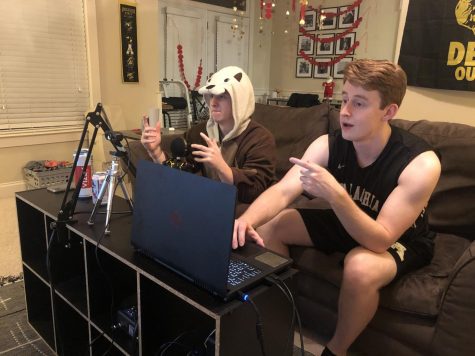
The incident went viral on social media and led to an increase in student attendance at basketball games, Stone said.
Strickland believes that many new ‘Neer Twitter accounts were created as a result of the incident and his content online, he said. It was the genesis of younger App State sports fans joining the ‘Neer Twitter conversation en masse.
Strickland and Stone utilized Twitter’s livestream feature to bring a new medium to ‘Neer Twitter content. The pair host regular streams on various topics from recruitment speculation to live game commentary.
In recent years, the new members joining ‘Neer Twitter have exposed a divide in how fans perceive App sports as a whole — one of the older versus the young. The younger fans refer to the older fans, those who attended App State during the 2007 Michigan upset or earlier, as “Boomer-‘Neers.”
On the one hand, younger fans criticize the older fans for encouraging a culture that they believe sugarcoats the reality of App State athletics performance.
“There’s definitely a split between what I think is more realism on this side of the spectrum and more ‘Everything is right, blah blah blah,’” said Strickland. “There’s much more realism on our side.”
Haynes, Johnson and “The Black and Gold Podcast” are the figureheads of this culture of positivity, Strickland said.
“They do it in the best interest of the show’s content,” Strickland said. “That means the more squeaky clean they keep the podcast, the easier it is to secure interviews with coaches.”
Haynes and Johnson said their perspective is not one of toxic positivity, but of honest optimism in light of their decades of experience viewing App State sports.
“If I’m piecing this together logically, there are a lot of younger fans who listen to us who have not experienced a 4-8 season,” Johnson said. “It’s easy for us to see a 9-3 season in football and say, ‘It sucks,’ but it’s easier to digest the reality of what comes with losing games you didn’t want to lose when you’ve seen other seasons like that.”
Johnson also argued that the younger culture of ‘Neer Twitter has never known App State football before 2015, a time marked by the transition from FCS to FBS, consistent winning seasons, and an unprecedented streak of six straight bowl wins in the first six years of FBS eligibility.
“We’re not doing this because we want to be mad at each other,” Haynes said. “We’re not trying to get our frustrations out of a bubble. That’s the reason why we’ve been able to do this as long as we have, because we enjoy it.”
The co-hosts also put a philosophy of respect and a refusal to slander anyone involved in the athletic department at the forefront of all of their content.
“I want to say what is true, what I think, but I don’t want to say it in a way that is going to embarrass somebody,” Johnson said.
Despite Strickland’s criticisms of “The Black and Gold Podcast” and its hosts, he didn’t downplay its achievements.
“I give them credit. They have loyal listeners and supporters,” Strickland said. “And they know what they’re talking about. They’ve been fans for decades.”
Younger fans are also frustrated by older fans that put a heavy focus on supporting the university financially upon graduating by joining the Yosef Club, the athletic program’s alumni booster organization. This is something that younger fans argue is too much to ask of graduates trying to pay off student debt. Both sides take their frustrations to Twitter.
“If you need a link to the Yosef Club, and don’t know where to find it, just Tweet ‘Hey, App football isn’t too good,’ and you will get the link in your replies,” Strickland said.
Staunch supporters of the Yosef Club, like Adams, argue that Twitter is crucial for increasing membership.
“I can’t emphasize enough how important it is for people to graduate and give back to the school with their Yosef Club membership,” Adams said. “To have people be engaged [on Twitter] is a good indication of their investment that I hope would increase membership.”
Given this rift in the fanbase, a delve into ‘Neer Twitter can feel overwhelming for casual sports fans. Followers of accounts like Strickland’s or Haynes’ can expect a handful of Tweets every hour and even more during games.
There are also some unwillingly involved in the online fanaticism who argue that ‘Neer Twitter isn’t doing the university any favors and, if anything, is making the fanbase look worse.
Ethan Joyce, App State football’s beat reporter for The Winston-Salem Journal, said he’s had to sacrifice his participation in ‘Neer Twitter to uphold the integrity of his career.
“I occupy a weird space, and I’m brought into it just because of the job,” Joyce said. “I try to make it really clear to people that reporters, if they’re doing their job right, are not a part of the fan base.”
As a journalist, Joyce said the majority of what he sees on Twitter is not just fans interacting and true information, but clickbait.
“I’d be lying if I said that I participate in App Twitter as much as I used to,” Joyce said. “Some of it is community, but some people are just trying to be noticed. Sometimes that can be good, sometimes that can be bad. I’m trying to pull away from my identity as ‘Ethan the App State beat reporter.’”
Despite users’ differences in opinion and desire to be seen, there is one thing all of ‘Neer Twitter has in common: a passion for App State sports to succeed and for the community to show their support.
“I think that the fans are a lot closer in common than they think,” Johnson said. “We’re watching a screen with two different movies. For us personally, we’re trying to enjoy App State sports and spread goodwill.”
All of these ‘Neer Twitter users, regardless of what they thought about App State athletics, gave a consistent reason for why they put so much time and effort into their accounts: the love of the game.
“It’s a lot of fun,” Stone said. “A lot of the stuff we post online are conversations that we’re having in person. It’s stuff that we think about and want to talk about. We have all of this built-up App State energy; I could talk to a wall about App State sports, and Twitter was the outlet.”
Many would argue that the social media platform, at its greatest, is designed for a phenomenon like ‘Neer Twitter.
“Twitter was, in my mind, built for sports,” Miller said. “We’re all watching at the same time. We’re all participating in this conversation. And if you have an opinion and you’re funny, your opinion is as good as anyone else’s.”
In a year marked by limited attendance at sporting events due to the pandemic, Twitter has been the platform where App State fans can commune.
Strickland said ‘Neer Twitter was more active when the Mountaineers played in the Sun Belt Conference men’s basketball championship than any other sporting event, including notable football games.
“You can’t go into the stadium and scream for hours, so people need to exercise their fanship where they can safely from their computer and phone,” Adams said.
Most notably, fans young and old came together recently to help a Mountaineer in need. ‘Neer Twitter circulated a GoFundMe for Michael Morgan, a 2019 graduate, to pay for his leukemia surgery earlier this year. The effort was so impactful that both Louisiana and Georgia Southern fans contributed to his surgery.
Some are hopeful that despite occasional divisiveness, ‘Neer Twitter can improve and be more inclusive. Strickland said the current makeup of ‘Neer Twitter users is not very diverse, and he believes that the issue is something that all of ‘Neer Twitter should consider ways to improve.
“Everyone should make a ‘Neer Twitter account,” said Strickland. “The more there are, the more fun.”
Correction: A previous version of this story incorrectly claimed the name of the team App State played when Will Strickland was kicked out. The error has been corrected.

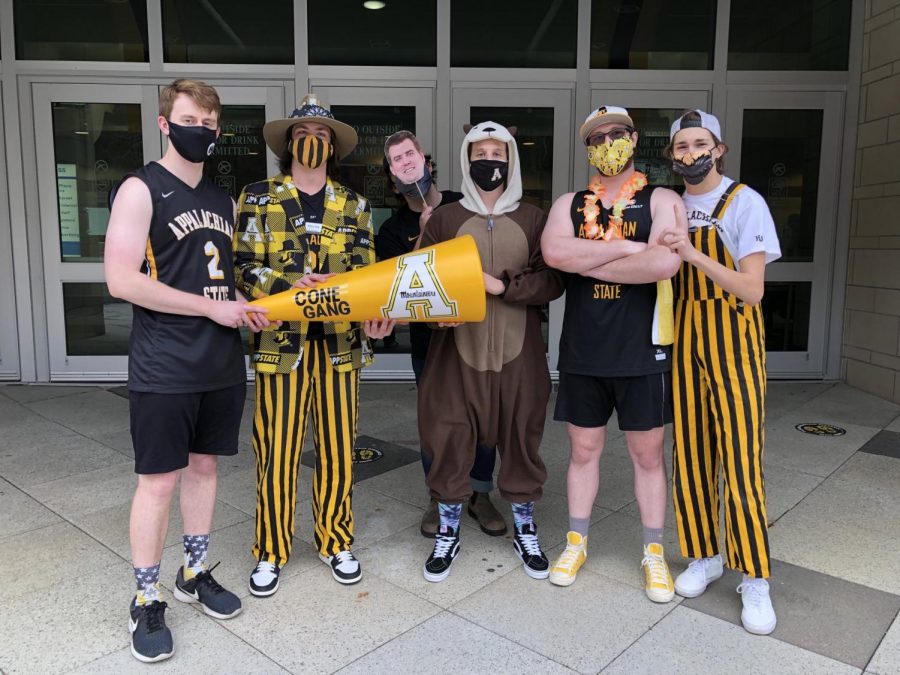
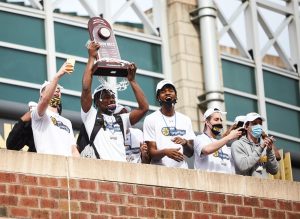
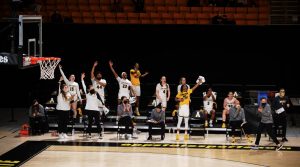
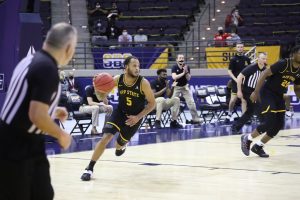
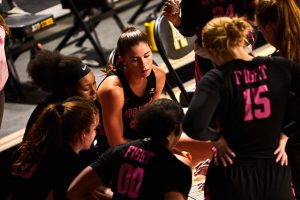













Reggie Hill • Mar 19, 2021 at 10:03 am
Great story David! Awesome job!